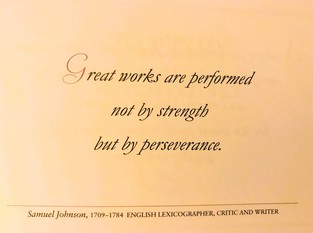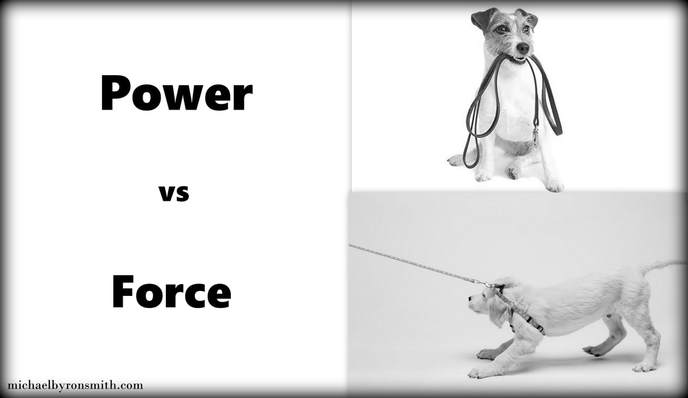
― Leo F. Buscaglia
Dear reader, do you know the difference between power and force? It can be confusing because each is commonly used to define the other. Usually, that’s okay because either term can be used in many situations. Where there is a difference, in my mind, is when those terms involve people. A particular area involving people, where the difference between power and force is truly important, is parenting.
Before I explain the differences in the two terms, I suspect you have thoughts about them that are similar to my own. As parents, we can use either power or force to shape and control our children. Whether we use power or force depends on our temperament, our patience, our attitude, the moment, etc. As human beings, we are very capable of making honest mistakes in our actions and reactions. What we can do is think ahead about the challenges of parenting that will no doubt come and decide, in advance, how we hope to handle them. Let me expand on that thought.
When ‘force’ is used by a parent, it is not a good situation. It suggests that persuasion or explanation is not involved and that understanding is not important. There will very likely be resistance by those being forced to do, or not do, something whether there is tangible evidence of the resistance or not. A simple example of the difference between the two is that ‘force’ is simply forceful (do it!), while ‘power’ is usually applied through suggestions or direction that are both respectful and respected (let’s do this).
Examples of Power
Throughout history, those who have achieved fame for the goodness they brought to the world were people of power. They used intelligence, compassion, and thoughtfulness to change society for the better. Jesus, Confucius, Buhhda, Abraham Lincoln, Helen Keller, Gandhi, Martin Luther King, Mother Theresa, Di Vinci, Madam Curie, Hippocrates, Eleanor Roosevelt, etc. are examples of individuals with the amazing power of influence over others.
Examples of Force
On the other hand, those who achieved historical infamy due to their inhumanity used force - a force applied through fear, muscle, aggression, greed, and even genocide to accomplish their goals. They are a stain on humanity. Examples are Stalin, Hitler, Pol Pot, Saddam Hussein, Kim Il Sung, Mao Zedong, Nero, Idi Amin, and Hirohito, to name a few. I use these examples to clarify what I mean when using the terms ‘power’ and ‘force’, particularly involving people and/or society.
Parental Impact
Those mentioned above impacted the entire world, some in very good ways and others in terrible ways. As a parent, you impact your family in, hopefully, many more good ways than bad. The scope of your impact may be minor in comparison, but just as powerful to those with whom you have a responsibility, most especially your children. This is true regardless if you are a birth parent, stepfather, or guardian. The proper use of power and/or force also applies to teachers, coaches, mentors, or anyone in a responsible position over others.
A father (or mother) who regularly uses force to get a child to conform is lazy about acquiring parenting skills and largely disinterested in forming important decision-making abilities in their children. Their priorities are somewhere else, possibly their career or simply self-indulgence. Parents that invest in skills that bring power to their words, thoughts, and desires are much more effective in the long run, but it takes time. Caring parents take the time because the futures of their children are very important to them.
Of course, there are situations where the use of reasonable force by a parent is necessary. These situations usually involve the safety or good of the child. But these situations happen infrequently with caring parents because they are mostly avoided. But when used for the benefit of a child, the reasons for the use of force should be explained to your child at an appropriate time.
The Differences - Force and Power
- Force is “because I told you so”. Power is being understood whether there is agreement or not.
- Force is disrespectful while power is respectful.
- Force is the tool of the weak minded. Power is the tool of a motivator.
- Force is disliked by all in its path. Power is respected by all who understand it.
- Force is the use of fear. Power is the use of understanding
- Force will last until it no longer exists. Power and its positive influences can last forever.
- Your use of force can turn against you. Power rarely will.
- Force is one dimensional. Power is omni-dimensional, with many aspects to its virtues.
- Force is coercion. Power is persuasion.
- Force is taking. Power is giving.
Summary
You have power as a parent when you can make things happen with little elaboration. A simple phrase will be understood and there will be trust in the outcome. It’s simple, but admittedly not easy. A parent must be a teacher, mentor, philosopher, psychologist, cheerleader, and disciplinarian. Few of us are adept at all these skills. But really, all that’s necessary to be an effective parent is a compassionate heart, thoughtful intellect, and planning. Power, when dealing with people, outdoes force every time.
For more thoughts on being a father (or parent) read my book, “The Power of Dadhood”, available at Amazon and Barnes and Noble.






